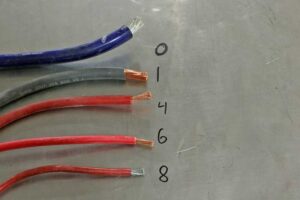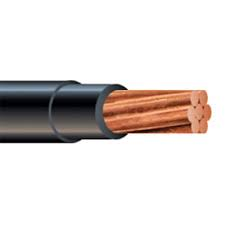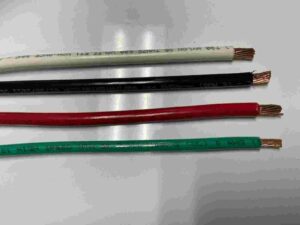Last Updated on October 22, 2023 by Kevin Chen
Image source: NAPA
Wire gauge size will always matter when it comes to choosing wires for your application. You will always want to end up with the right size. You have two options; 4 gauge vs 8 gauge wires. Which one should you buy?
These are two different sizes and so you need to be careful when making that choice. Of course the right size gauge will always deliver the best results.
This article is dedicated to helping you make the right decision. We will break down the differences between the two other than their sizes. At the end of it all, you will be in a perfect position to make a sound decision on which wire to buy.
4 Gauge wire overview
Image source wire and cable your way
So, what do you mean by a 4 gauge wire?
A 4 gauge wire, or 4 AWG is a wire size that is mainly used for the high-power applications. By this we mean the high-voltage and high-current devices and appliances.
This wire sports a diameter of 0.225 inches or 5.715mm and has the capacity of up to 65 amps of current thanks to its large size.
4 gauge wires come in either copper and aluminum options. Each material comes with its pros and cons though copper is mostly preferred due to its numerous desirable features.
However, you will have to deal with the cost that comes with using this large-sized wire. It is costlier than most smaller wires even though this will depend on where you are buying.
The ideal size of 4 AWG makes them versatile. They can be used for both residential and commercial applications For example, you can easily find the wires in heavy machinery.
Application of 4 AWG wire
4 gauge wires are used in residential and commercial buildings. They are also applicable in automotive and even marine applications.
When it comes to the wiring systems, 4 gauge wires are often used in the wiring of electrical panels which are quite pivotal in the distribution of electricity in both residential and commercial buildings.
For the automotive applications, you will find 4 gauge cables in the lighting systems, audio systems and even power systems of the vehicles. The same applies to the marine applications of 4 gauge wires.
8 Gauge wire overview
Image source Ebay
This is another wire that is widely used in different range of applications. The wire measures 0. 125 inches (diameter), meaning that it is relatively thinner than the 4 gauge wire.
It is usually categorized between the medium-heavy duty wires. Even though it is tinner than the 4 gauge, it is quite thick in comparison to many other wires in the market.
The wire has a rated maximum capacity of 50 amps, implying that it can meet most of the electric needs that are slightly heavy-power.
Most 8 gauge wires are made of coper though you can find some that are made of aluminum.
They feature heavy-duty insulation materials that protect the conducting elements from physical and chemical damage. These insulating materials come in different colors and can be used to identify the wires.
Also, 8 gauge wires come in different length although there is a specific limit when exceeded the conductivity and the overall performance of the wire is likely to be affected.
Application of 8 gauge wire
8 AWG wires are normally used on applications that sit between medium and heavy duty. These applications include domestic wiring, light industrial machinery, automotive among others.
How do I know it is a 4 gauge or 8 gauge wire?
There are various ways in which you can identify a wire is a 4 AWG or 8 AWG. The easiest one is to check on the label of the wire’s insulation. It should be indicated “4 AWG” or “8 AWG”
The color of the insulation is another indication, even though this will vary from one manufacturer to another. So, you should read the data sheet to know this.
Also, given the two wire options, you can identify them by their diameter. 4 AWG is definitely bigger than 8 AWG.
If you are not sure, you can seek an expert’s help with the identification. A reputable electronic components sourcing agent such as ICRFQ will easily identify the wires and ensure you get the right size. Yours is to specify the size you want.
So which one should I choose between the two?
From this detailed comparison, you can tell which wire gauge to choose between 4AWG vs 8AWG.
The choice will definitely depend on the application area and the amount of power that the wire will be carrying.
Back to the basics, the lower the gauge number, the thicker the wire, meaning that it has more capacity to handle power. The reverse is true for the high gauge number as it is an indication that they are thinner hence lower capacity.
Knowing this, you can tell that 4 gauge is a better option for the high-power applications than the 8 gauge wire.
So, it is up to you to analyze each application area and decide which one is a perfect choice.
Buying 4AWG and 8 AWG wires
Once you know the right wire size for your application, you can proceed to buy it.
Ensure that you get from the best 4 gauge and 8 gauge wire suppliers in China. This way, you can be sure of not only the correct size but also high quality of wire suitable for your application.
Check on the type of insulator that has been used on the wire and all the relevant labels. They are some of the few things that tend to define the quality of a wire.
Find out the cost of the wire and the manufacturer.
Meanwhile, we at ICRFQ are committed to helping you make the right choice of wire gauge.
We are a reputable supplier of 4AWG and 8AWG wire sizes in China. We source our wires from the best manufacturers and deliver to our customers.
All you need to do is contact us.
If you want to find more Electronic Components Distributors, please check out the following articles:
Electronic Components Distributors In the USA
Electronic Components Distributors In UK
Electronic Components Distributors In China
Electronic Components Distributors In India
Electronic Components Distributors In Singapore
Electronic Components Distributors In Malaysia
Electronic Components Distributors In Vietnam
Electronic Components Distributors In South Korea
- Where to buy IC chips? The Best Guide? - March 26, 2024
- Breaking Down Barriers: Overcoming Obstacles in Cross-Border Electronic Component Trade - March 4, 2024
- Everything You Need to Know About Amplifier IC Chips - March 4, 2024







